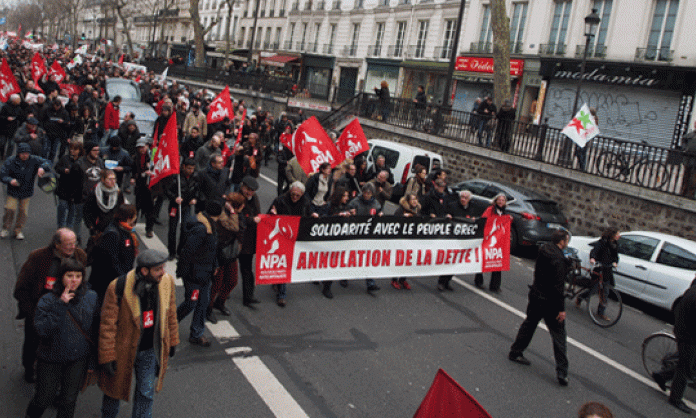Marches in solidarity with Greece’s workers and the left wing SYRIZA government were held across Europe this weekend. From France to the Mediterranean the words echoed: “We won’t pay your debt!”
In Paris, we chanted: “From Athens to Paris, our struggles have no borders!” Similar protests were held in Rome, London and Madrid.
The demands of the demonstrations were clear: end the politics of austerity and stop the strangulation of the new SYRIZA government. It was a message to the European Central Bank (ECB) and the European ruling class that they will not easily get away with their blackmail of a government that promises hope and an end to the degradations of austerity.
In Europe, history is being written. Greece is the focal point of a clash with the despotic institutions of the European Union and their local capitalist classes. The SYRIZA victory in the 25 January election is the most important step that the class struggle in Greece has taken thus far.
The left has experienced horrific defeats in that country, but the current battle is undermining British former PM Margaret Thatcher’s dogma that “there is no alternative” to neoliberal capitalism.
Militant workers across Europe are watching the events unfold in Greece. Théo, a member of the New Anti-Capitalist Party and a militant in France’s General Confederation of Labour (CGT), explained the significance of the struggle:
“It is a symbol of hope. It is fundamental to show that another politics is possible, a politics that isn’t in the service of the banks and finance. SYRIZA is the result of five years of workers’ struggle in Greece against the politics of austerity, the Troika [the name given to the partnership of the European Commission, the ECB and the International Monetary Fund – which dictate the terms of loans and repayments to Greece] and attacks on the public service.
“This mobilisation is important for the Greek people, but also for us here, because, all the workers and people of Europe are hit by austerity to pay the debt that isn’t theirs. We must continue the struggle. We must mobilise so that the SYRIZA government holds to its commitments. The struggle must go on in Greece, with strikes and demonstrations.”
For Ahmed, also a militant in the CGT, the reasons to fight are simple: “We have the same battle and the same enemy, the Troika”. Though the struggle in France is not yet “at [Greece’s] level of struggle, we will need their support in the future. The workers must unite across Europe”, he said, as he held his red CGT flag.
Only the red flag of workers’ struggle can point the way out of the defeats witnessed for many years in Europe. Solidarity with Greece in countries across Europe is an essential ingredient to the frontal clash taking place there.
As Stathis Kouvelakis, a member of SYRIZA’s national leadership, explained in an 8 February article for International Viewpoint: “It is in the combination of the determination of the Greek leadership, the mobilisation of the people and international solidarity that the ‘magic formula’ of a possible victory can be found”.
The demonstrations in Paris and abroad were a part of this “magic formula”.




